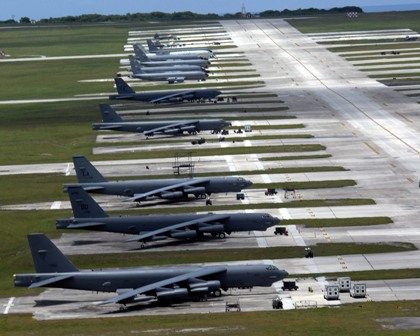Soaring tensions on the Korean peninsula have seen dire North Korean threats met with an unusually assertive US response that analysts warn could take a familiar game into dangerous territory.
By publicly highlighting its recent deployment of nuclear-capable B-52 and stealth bombers over South Korea, Washington has, at times, almost appeared to be purposefully goading an already apoplectic Pyongyang.
“There certainly seems to be an element of ‘let’s show we’re taking the gloves off this time’ about the US stance,” said Paul Carroll, program director at the Ploughshares Fund, a US-based security policy think-tank.
And the North has responded in kind, declaring on Saturday that it was now in a “state of war” with South Korea.
Security crises on the Korean peninsula have come and gone over the decades and have tended to follow a similar pattern of white-knuckle brinkmanship that threatens but finally pulls back from catastrophic conflict.
North Korea’s founding leader Kim Il-Sung and his son and successor Kim Jong-Il were both considered skilled practitioners of this high-stakes game of who-blinks-first diplomacy.
And they ensured Pyongyang had enough form to lend its threats credibility, having engineered provocations that ranged from blowing up a South Korean civilian airliner in 1987 to shelling a South Korean island in 2010.
The current crisis, with Pyongyang lashing out at a combination of UN sanctions and South Korea-US military exercises, diverges from precedent in terms of the context and the main characters involved.
It follows the two landmark events that triggered the UN sanctions and re-drew the strategic balance on the peninsula: The North’s successful long-range rocket launch in December and its third — and largest — nuclear test in February.
Both may have emboldened North Korea to overplay its hand, while at the same time prompting Washington to decide there was already too much at stake to consider folding.
“Rhetorical salvoes are one thing, while rocket launches and nuclear tests are quite another,” said Carroll.
In addition, both North and South Korea have new, untested leaders with a strong domestic motivation to prove their mettle in any showdown.
Bruce Klingner, a Korea expert at the conservative Heritage Foundation in Washington, believes the danger of “miscalculation” is especially high from North Korea’s young supremo Kim Jong-Un.
Kim was not only emboldened by the successful rocket and nuclear tests, but “also by the knowledge that Seoul and Washington have never struck back in any significant way after previous deadly attacks”.
This time around, however, South Korea has signalled it would respond with interest, and the message sent by the B-52 and stealth bomber flights is that it has the US firmly in its corner.
Peter Hayes, who heads the Nautilus Institute, an Asia-focused think tank, points out that the B-52 deployment carried a particular — and potentially dangerous — resonance.
After a bloody border incident in 1976 left two American soldiers dead, the United States spent weeks sending flights of B-52 bombers up the Korean peninsula, veering off just before they entered the North’s air space.
Then US secretary of state Henry Kissinger commented that he had “never seen the North Koreans so scared”.
Hayes warned that replaying the B-52 threat could prove to be “strategically stupid” by reviving the North’s historic and deep-rooted fear of a US nuclear strike.
“The B-52 deployment also declares loudly and clearly that they have forced the US to play the game of nuclear war with North Korea,” Hayes said.
“It tells them it has reached the hallowed status of a nuclear-armed state that matters enough to force a simulated nuclear-military response,” he added.
The possible end-game scenarios to the current crisis are numerous, but none point to an obvious path for defusing the situation peacefully.
Most analysts rule out the prospect of a full-scale war on the grounds that North Korea knows it would lose, just as it knows that launching any sort of nuclear strike would be suicidal.
But after threatening everything from an artillery assault to nuclear armageddon, there is also a sense that Kim Jong-Un has pushed himself into a corner and must do something to avoid a damaging loss of face and credibility.
A provocative missile test fired into the sea over Japan is one option with a relatively low risk of further escalation.
Several analysts had originally predicted a limited artillery strike similar to the 2010 shelling of Yeonpyeong island, but the US and South Korean vows of a tough response have called into question just how “limited” such a move would prove to be.
Scott Snyder, a senior fellow for Korea studies with the Council on Foreign Relations, suggested that the United States, having delivered its message loud and clear, should now provide Kim with a way out.
“There is a need for the United States and South Korea to offer some clear diplomatic gestures of reassurance toward the North that can help the North Koreans climb down, calm down, and change course,” Snyder said.










